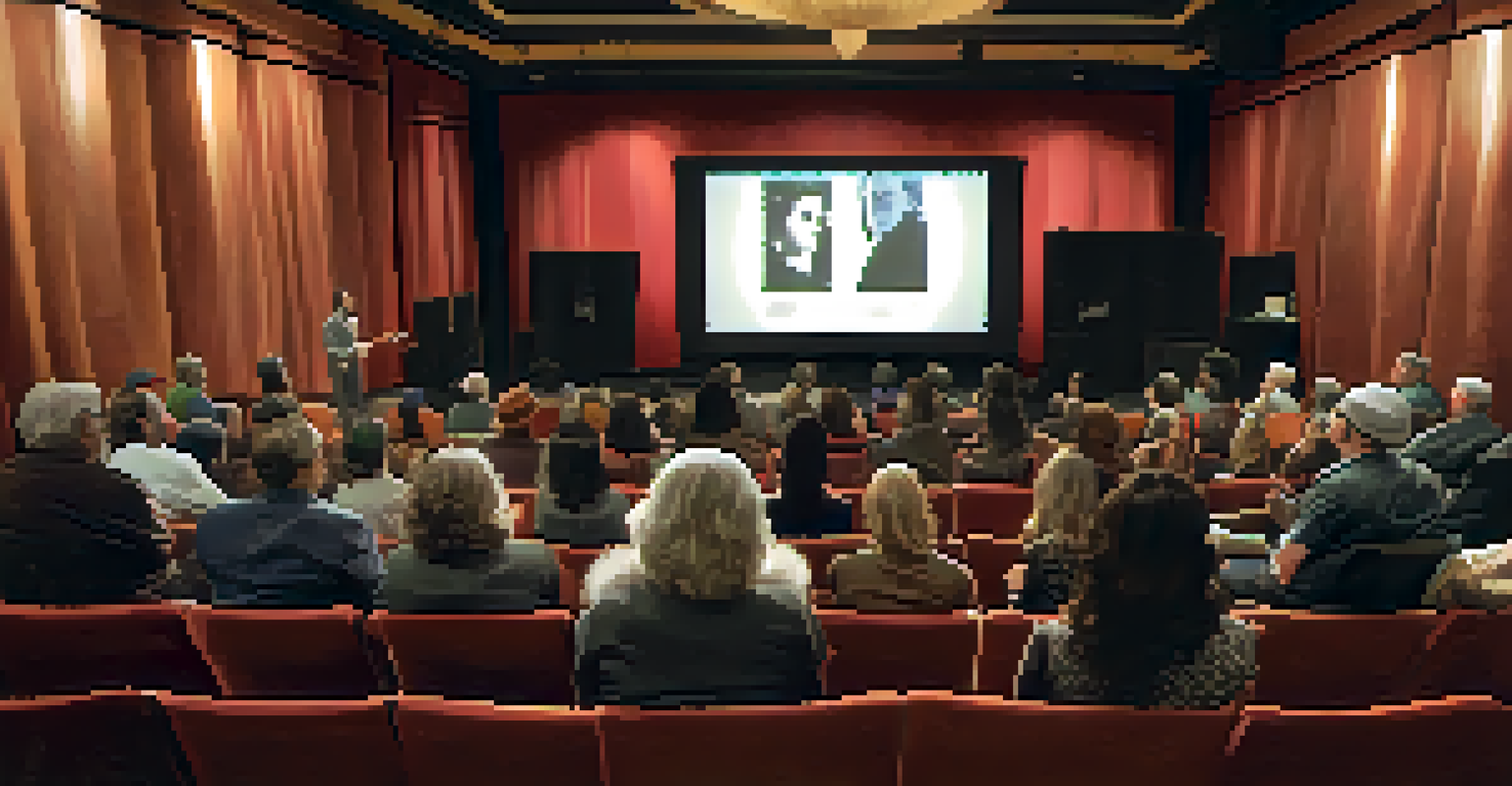The Role of Film Festivals in Promoting Preservation Efforts

Understanding Film Festivals and Their Purpose
Film festivals serve as vibrant platforms where filmmakers showcase their works. They celebrate creativity and provide opportunities for networking and exposure. But beyond entertainment, many festivals also focus on significant cultural and historical themes, including the preservation of cinema.
Film is not just a medium of entertainment; it is a vital part of our cultural heritage that deserves to be preserved.
These events often highlight films that may otherwise be forgotten, shining a light on important narratives and styles that shaped the industry. By curating diverse selections, film festivals encourage audiences to appreciate the breadth of cinematic history. This appreciation is crucial for promoting preservation efforts.
Furthermore, festivals often host discussions and panels that educate attendees about the importance of preserving film as an art form. By engaging audiences in these conversations, they foster a community that values and advocates for the protection of cinematic heritage.
Spotlight on Film Preservation Initiatives
Many film festivals have dedicated programs aimed at film preservation, collaborating with organizations that specialize in restoring and archiving films. For instance, festivals may screen restored classics or feature documentaries about preservation efforts. This not only entertains but also educates audiences about the fragile nature of film.

By highlighting these initiatives, festivals raise awareness about the technical and financial challenges faced in preserving older films. They also promote the idea that preserving cinema is not just about saving old reels but about maintaining cultural narratives for future generations. This understanding encourages community support for preservation efforts.
Film Festivals Preserve Cinematic History
Film festivals play a crucial role in showcasing and preserving significant cultural narratives and important cinematic works.
Moreover, film festivals often partner with local film archives or preservation societies, helping to fund restoration projects. This collaboration amplifies the impact of their efforts, ensuring that beloved films are preserved and accessible for years to come.
Engaging Audiences Through Interactive Experiences
Film festivals frequently create interactive experiences that engage audiences in the preservation narrative. This can include workshops on film restoration techniques or exhibits showcasing the evolution of filmmaking. Such experiences make the topic of preservation accessible and relatable.
The preservation of film is the preservation of our collective memory.
By allowing attendees to participate, festivals foster a deeper connection to the films being showcased. This connection can inspire individuals to become advocates for preservation, whether through donations, volunteering, or simply spreading awareness. Engaging audiences in this way transforms passive viewers into active participants in the preservation movement.
Moreover, these interactive elements often highlight the significance of diverse voices in film history. By emphasizing underrepresented artists and stories, festivals ensure that a wide array of cultural narratives is preserved and celebrated.
The Role of Documentaries in Preservation Efforts
Documentary films play a vital role in the preservation conversation, often spotlighting the stories behind iconic films or the importance of safeguarding cinematic history. Festivals provide a platform for these documentaries, educating audiences about the challenges faced by preservationists. This education is essential for fostering a culture that values film heritage.
By showcasing these documentaries, festivals not only entertain but also inform viewers about the ongoing efforts to preserve film. They highlight the work being done to restore classics and the importance of maintaining access to these cultural treasures. Documentaries can serve as a rallying call for audiences to support these initiatives.
Interactive Experiences Engage Audiences
Festivals create interactive opportunities that transform passive viewers into active advocates for film preservation.
Additionally, by featuring filmmakers who focus on preservation topics, festivals create a space for dialogue and advocacy. This dialogue is crucial for inspiring action and ensuring that the conversation around film preservation continues to thrive.
Networking Opportunities for Preservationists
Film festivals serve as networking hubs for filmmakers, enthusiasts, and preservationists alike. These events provide a unique opportunity for professionals to connect and collaborate on preservation projects. The exchange of ideas and resources can significantly enhance preservation efforts.
By facilitating these connections, festivals help build a community of individuals passionate about preserving cinematic history. This network can lead to innovative solutions for challenges faced in film preservation, from funding to technology. Collaborations formed at festivals can result in impactful projects that benefit the entire industry.
Moreover, networking opportunities often extend to discussions on best practices for preservation. By sharing knowledge and experiences, preservationists can learn from one another and strengthen their efforts to safeguard film heritage.
Highlighting Cultural Diversity in Film Preservation
Film festivals often showcase a wide range of films from diverse cultures, emphasizing the importance of preserving global cinematic heritage. This commitment to diversity not only enriches the festival experience but also highlights the need to preserve films that represent various cultures and histories. Celebrating this diversity is crucial for a comprehensive understanding of film preservation.
By featuring films from different countries and cultures, festivals promote awareness of the unique challenges faced in preserving international cinema. This can include issues related to funding, access, and historical context. Audiences are encouraged to appreciate and support the preservation of films that tell stories from around the world.
Diversity Enhances Film Preservation
By highlighting films from various cultures, festivals emphasize the importance of preserving global cinematic heritage.
Additionally, festivals may host panels or discussions that focus on the preservation of culturally significant films, fostering dialogue around their importance. By engaging in these conversations, attendees are more likely to understand the broader impact of film preservation on cultural identity and heritage.
The Future of Film Festivals and Preservation Efforts
As the film industry continues to evolve, so do the roles of film festivals in promoting preservation. With advancements in technology, festivals can utilize digital platforms to expand their reach and engage with a broader audience. This shift presents new opportunities for raising awareness and funds for preservation initiatives.
Moreover, the ongoing discussion around the importance of preserving cinematic history will likely shape the programming of future festivals. As audiences become more aware of the significance of preservation, they will demand more content centered on this theme. This shift can lead to an increased focus on preservation within festival agendas.

Ultimately, the future of film festivals will depend on their ability to adapt and respond to the needs of both filmmakers and preservationists. By continuing to champion preservation efforts, festivals can ensure that the rich tapestry of cinema remains intact for generations to come.